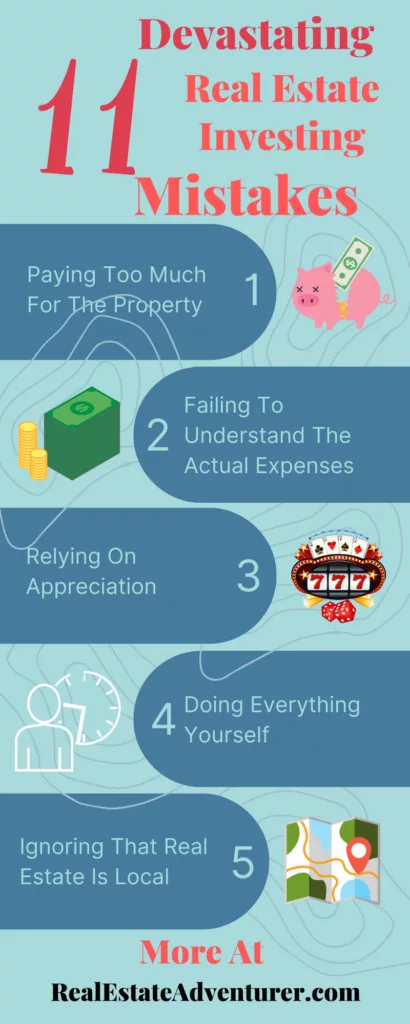
Real estate investing can be a lucrative way to build wealth, but many pitfalls can lead to financial loss. I have been investing in real estate for over 15 years and have made many real estate investing mistakes. Over the years, I’ve realized which blunders are the most disastrous and what to do about them.
Many would be real estate investors spend a lot of time researching and never start investing. This is a big mistake, and the best way to overcome that is to buy a property significantly below market value and become a real estate investor. However, analysis paralysis is not investing, so it can’t be a real estate investing blunder.
I’ll show you the worst real estate investing mistakes and what to do about them. Most importantly, be sure to avoid number one.
Horrible Real Estate Investing Mistakes
1. Paying Too Much For The Property
Of all real estate investing mistakes, paying too much for investment real estate is the most catastrophic. Often, the investor is excited to get a property and can’t negotiate the right deal, but they purchase anyway. Other times, real estate investors do not know what price makes the purchase a good deal.
It doesn’t matter why the investor paid too much for the property, only that they did. Paying too much for the property is the most devesting mistake and will haunt you for as long as you own the property. Here are some reasons you should never pay too much for an investment property.
- Reduced Cash Flow: When you overpay for a property you intend to hold as a rental, your rental income is unlikely to cover your expenses and mortgage payments. This can leave you with negative cash flow, which can be challenging to recover from. This negative cash flow will eventually require you to inject more money into the real estate business, which is sustainable over the long run. If you need help deciding what to pay for a rental house, read my article on exactly how much to pay for a rental house.
- Difficulty Selling: When flipping a house, overpriced properties can be challenging to sell. Buyers will only pay what the property is worth; mortgage underwriting rules usually prevent it. This can leave you with a property that’s difficult to unload and a drain on your finances. My house flipping for beginners guide will show you how much you should pay when flipping a house.
- Limited Appreciation Potential: If you are a long-term investor planning to grow wealth over time with property appreciation, paying too much is detrimental. If you spend too much upfront, you may not see significant gains in the property’s value over time, reducing your return on investment. Appreciation benefits are always better when you pay less for the property.
- Opportunity Costs: Overpaying for one property can prevent you from investing in other, more profitable opportunities. You may miss out on other investments that could provide a better return by tying up your capital in an overpriced property.
- Increased Risk: When you overpay for a property, you take on more risk than necessary. Every possible problem with a real estate investment is less severe when you pay less for the property. Sometimes, a disastrous situation is rendered trivial when you pay low enough for the property. In other cases, a minor inconvenience becomes a catastrophic mistake because you paid too much for the property.
Paying too much for the property is the most costly mistake a real estate investor can make. As an investor, your goal should be to purchase real estate significantly below its market value; your goal is not to accumulate properties regardless of the price. Paying too much for the property is the most disastrous of all real estate investing mistakes. By being disciplined and patient, you can avoid this common pitfall and set yourself up for success in real estate investing.
2. Failing To Understand The Actual Expenses

Failing to understand the actual expenses of an investment property can be a costly mistake for any real estate investor. While focusing on a property’s potential income and returns are easy, ignoring the expenses can lead to financial trouble. Here are some reasons why failing to understand the true expenses can lead to failure.
- Unable to Budget: Accurately budgeting for an investment property is essential to success. When expenses are not adequately understood, creating a budget that accurately reflects the costs of owning and operating the property can be difficult.
- Unexpected Costs: The inability to budget, as a result of failing to account for all expenses, can lead to unforeseen costs down the line. For example, repairs or maintenance issues that should have been budgeted for may arise, eating into profits.
- Increased Risk: Failing to understand the actual expenses can also increase the risk of financial trouble. If a property is not generating enough income to cover expenses, the investor may be forced to sell it at a loss or default on their mortgage.
The expenses of owning a rental house will be significant over time. Academic studies have shown that the average operating expenses of a rental properties are about 40% of the rental income. This is a considerable number, and when paired with a mortgage payment, it will consume an enormous portion of the monthly rent.
Understanding that your expenses are considerably more than property taxes and insurance is just as crucial as doing due diligence when buying a rental property. You must stay within your renovation budget when engaged in a house flip. If this budget is inaccurate, and you go over your estimate by even a tiny amount, you could end up with a loss after selling the property and paying a real estate agent’s commission.
3. Relying On Appreciation

Relying on appreciation is speculative, and speculative investment is akin to gambling. While appreciation can be a significant factor in the success of a real estate investment, relying solely on it can lead to financial trouble down the line. Here are some of the key reasons why this approach is problematic:
- Lack of Control: Unlike other types of investments, real estate investors have a significant amount of control over the performance of their properties. However, appreciation is primarily influenced by factors outside of an investor’s control, such as the overall economy and local housing market conditions. Relying solely on appreciation means that investors are placing their financial future in the hands of these external factors.
- Unreliable Cash Flow: Investing in a property for appreciation only means that there may be little to no rental income to offset expenses. This can lead to negative cash flow and financial strain, especially if the property does not appreciate as expected. Even when appreciation occurs, it often takes years to realize a profit.
- Difficulty in Selling: Investing in a property solely for appreciation can make it challenging to sell the property. If the market is not favorable, the real estate investor may be left with a property that is difficult to unload. Real estate transaction costs are high, and appreciation is often insufficient to cover the closing costs.
- Increased Risk: Relying on appreciation also increases the risk of financial trouble. If the event of a market downturn or local economic changes, the property’s value may decrease, leaving the investor with a loss on their investment.
It’s always good to benefit from property appreciation; it takes no work and is the icing on the investment cake. However, making a real estate investment that depends solely on appreciation can be risky and costly. One of the most common mistakes new real estate investors make is having appreciation as their only exit strategy.
Real estate investors can insulate themselves from the effect of the local real estate market by focusing on income-producing properties purchased below market value. This will allow them to benefit from appreciation but avoid the adverse side effects of depreciation.
4. Doing Everything Yourself

When you first start, it may seem tempting to do everything yourself. You may have heard that sweat equity is how to get ahead fast, but it’s not. Here are some of the most common issues that can arise when investors try to handle everything themselves:
- Time Constraints: Real estate investing is time-intensive, and trying to do everything yourself will be overwhelming. Investors who take on too much may find they cannot keep up with the day-to-day demands of managing their properties.
- Difficult to Scale: You can only do so much; as you scale, your progress will be held back by your ability to get to everything. It is tempting to say that you will bring on help as the workload increases, but that is harder to do. It’s better to get help early and learn how to manage everything before you are overwhelmed.
- Burnout: Trying to do everything oneself will quickly lead to burnout. Real estate investing requires significant time and effort, and investors who try to take on too much may become exhausted and lose motivation. I had a partner when I got my first three houses, and he insisted on doing everything himself; now I have over 70 properties, and he stopped investing after those three houses.
- Increased Risk: Failing to hire experts or outsource tasks can increase the risk of making costly mistakes. Investors who handle their repairs and maintenance may overlook safety hazards or fail to make necessary repairs, putting tenants at risk and exposing themselves to liability. Setting up the wrong corporate structure to save a few bucks can lead to severe consequences as you grow; this happened to me.
Doing everything yourself is a huge mistake. That’s not to say there are no benefits to taking an active role in your real estate investments. You should understand what’s happening and make big decisions. However, by outsourcing tasks, seeking expert advice, and focusing on one’s core competencies, real estate investors can reduce risk and set themselves up for long-term success.
5. Ignoring That Real Estate Is Local

Al real estate is local. Market trends, home values, rent amounts, and vacancy rates differ significantly between locations. That is not to say that location is the most critical aspect of real estate investing; it just means that a real estate investor must understand the local area.
Here are some of the main reasons why you should not ignore the local aspect of real estate investing.
- Different Rules and Regulations: Real estate regulations vary from one market to another. Investors who are not familiar with the local rules and regulations may find themselves facing unexpected challenges or legal issues.
- Market Variability: Real estate markets can vary significantly from one geographic area to another. Failing to consider this can mean investors make decisions based on inaccurate or incomplete data, leading to poor investment decisions. I have seen many investors overpay for a house in a small town because it sounds like a steal based on their big-city market.
- Increased Risk: Ignoring that real estate is a local market can increase the risk of making poor investment decisions. Real estate investors who do not take the time to research and understand local market conditions may find themselves investing in properties that do not perform as expected, leading to financial losses.
The third house I purchased was a bank-owned property for $27,000, which needed little work. This was a larger house in a depressed neighborhood that would generate cash flow at my price. The previous owner, from a much bigger city, had paid over $90,000 for the house that was eventually lost in foreclosure. If the original owner had understood the local market, they would never have paid such an outrageous price for that house.
Recognizing that real estate is a local market is essential for inexperienced investors who want to succeed long-term. By staying up-to-date on local market conditions, seeking out expert advice, and focusing on their core competencies, real estate investors can reduce their risk and set themselves up for success. As a beginner, it’s best to start with an area that you know well and master that area before branching out.
More Costly Mistakes
I’ve covered the most devastating mistake a real estate investor can make. However, there are more costly mistakes that successful investors have learned to avoid.
6. Get Rich Quick Mindset
Is it any wonder that many new investors start with a get-rich-quick mindset? The real estate investing gurus focus their pitch on how easy it is to get big money rolling in. In reality, growing your net worth with real estate investing take time and discipline. You can make a fortune investing in real estate with patience, but it won’t come quickly.
7. Investing with Emotions
Investing based on emotion is one of a newer real estate investor’s biggest mistakes. They may pass on the best deals because the house is ugly. Or, they turn the renovation into a creative outlet. When investing in real estate, an analytical approach will serve you well.
8. Ignoring Cash Flow
It’s always a good idea to pay attention to cash flow. Even the most profitable deal requires positive cash flow to sustain it long-term. If the investor constantly puts personal money into the project, it will inhibit their ability to scale. I’ve often seen a first-time investor get into the business for the passive income and then make decisions that decimate that income.
9. Failing to Negotiate
You make money when you buy, or so the adage goes. The purchase price is the asking price, so let the sellers ask for it. A real estate investor should always negotiate the best price possible. Paying less for the house is a great way to mitigate risks, and I’ve never seen a situation when it’s better to pay more.
10. Overspend on Renovations
Spending a lot of money on renovations can eat up your profit. It’s essential to accurately estimate expenses before you purchase the property and then renovate it to the standard of the neighborhood. Don’t over-renovate on an investment property; save the creative decisions for your house.
11. Not Insuring the Property
Not insuring the property is a big mistake many investors make with their first property. If you don’t think you will need insurance, get a high-deductible policy. You rarely need it, but the results can be devastating if you don’t have it. The same goes for title insurance.
Conclusion
Real estate investing can be lucrative and provide financial freedom, but it’s not without challenges. Many newbie investors fail to achieve their goals in this industry, and there are several reasons why. In this article, I’ve shown the eleven most devastating real estate investing mistakes.
If you have not noticed, the increased risk results from every category of real estate investing mistakes. You must reduce risk to enjoy a long-term, successful real estate investment career. Understanding and avoiding these common pitfalls can increase your chances of becoming a successful real estate investor. For more information, read my ultimate guide to buying rental property.



